
Franking
Encyclopedia
Franking are any and all devices or markings such as postage stamps (including printed and/or embossed on postal stationery
), printed or stamped impressions, codings, labels, manuscript writings (including "privilege" signatures), and/or any other authorized form of markings affixed or applied to mails to qualify them to be postally serviced.
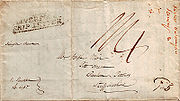 While all affixed postage stamps and other markings applied to mail to qualify it for postal service are franking (or "franks"), not all types and methods are used to frank all types or classes of mails. Each of the world's national postal administrations establishes and regulates the specific methods and standards of franking as they apply to domestic operations within their own postal systems. Although there are differences in the manner that the postal systems of the 191 nations that belong to the Universal Postal Union
While all affixed postage stamps and other markings applied to mail to qualify it for postal service are franking (or "franks"), not all types and methods are used to frank all types or classes of mails. Each of the world's national postal administrations establishes and regulates the specific methods and standards of franking as they apply to domestic operations within their own postal systems. Although there are differences in the manner that the postal systems of the 191 nations that belong to the Universal Postal Union
(UPU) apply and regulate the way their mails are franked, most mails fall under one (and sometimes more) of four major types and/or methods of franking: postage (stamps, etc.), privilege, official business, and business reply mail.
Any and all conflicts that might arise affecting the franking of mails serviced by multiple administrations which result from differences in these various postal regulations and/or practices are mediated by the UPU, a specialized agency of the United Nations
which sets the rules and technical standards for international mail exchanges. The UPU co-ordinates the application of the regulations of postal systems of its member nations, including as they relate to franking, to permit the servicing and exchange of international mails. Prior to the establishment of the UPU in 1874, international mails sometimes bore mixed franking
(the application of franking of more than one country) before the world's postal services universally agreed to deliver international mails bearing only the franking of the country of origin
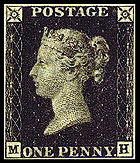
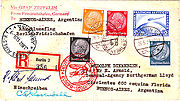 "Postage" franking is the physical application and presence of postage stamps, or any other markings recognized and accepted by the postal system or systems providing service, which indicate the payment of sufficient fees for the class of service which the item of mail is to be or had been afforded. Prior to the introduction to the world's first postage stamps in Britain in 1840 ("Penny Black
"Postage" franking is the physical application and presence of postage stamps, or any other markings recognized and accepted by the postal system or systems providing service, which indicate the payment of sufficient fees for the class of service which the item of mail is to be or had been afforded. Prior to the introduction to the world's first postage stamps in Britain in 1840 ("Penny Black
") and 1841 ("Penny Red
"), pre-paid franking was applied exclusively by a manuscript or handstamped "Paid" marking and the amount of the fee collected. The first US postage stamp was the red brown Five cent Franklin (SC-1) issued in 1847.
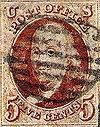
 In addition to stamps, postage franking can be in the form of printed or stamped impressions made in an authorized format and applied directly by a franking machine, postage meter
In addition to stamps, postage franking can be in the form of printed or stamped impressions made in an authorized format and applied directly by a franking machine, postage meter
, computer generated franking labels or other similar methods ("Postage Evidencing Systems"), any form of preprinted "postage paid" notice authorized by a postal service permit ("Indicia"), or any other marking method accepted by the postal service and specified by its regulations, as proof of the prepayment of the appropriate fees. Postal franking also includes "Postage Due" stamps
or markings affixed by a postal service which designate any amount of insufficient or omitted postage fees to be collected on delivery.
 "Privilege" franking is a personally pen-signed or printed facsimile signature of a person with a "franking privilege" such as certain government officials (especially legislators) and others designated by law or Postal Regulations. This allows the letter or other parcel to be sent without the application of an actual postage stamp. In the United States this is called the "Congressional frank" which can only be used for "Official Business" mail.
"Privilege" franking is a personally pen-signed or printed facsimile signature of a person with a "franking privilege" such as certain government officials (especially legislators) and others designated by law or Postal Regulations. This allows the letter or other parcel to be sent without the application of an actual postage stamp. In the United States this is called the "Congressional frank" which can only be used for "Official Business" mail.
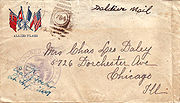 In addition to this type of franking privilege, from time to time (especially during wartimes) governments and/or postal administrations also authorize active duty service members and other designated individuals to send mails for free by writing "Free" or "Soldier's Mail" (or equivalent) on the item of mail in lieu of paid postal franking, or by using appropriate free franked postal stationery. Unless otherwise designated, such mails are serviced by both the military
In addition to this type of franking privilege, from time to time (especially during wartimes) governments and/or postal administrations also authorize active duty service members and other designated individuals to send mails for free by writing "Free" or "Soldier's Mail" (or equivalent) on the item of mail in lieu of paid postal franking, or by using appropriate free franked postal stationery. Unless otherwise designated, such mails are serviced by both the military
and civil postal systems that accept them as First Class letter mail.
 "Official Business" franking is any frank printed on or affixed to mails which are designated as being for official business of national governments (i.e. governments which also have postal authority) and thus qualify for postal service without any additional paid franking. In Commonwealth countries the printed frank reads "Official Paid" and is used by government departments on postmarks, stationery, adhesive labels, official stamps, and handstruck or machine stamps.
"Official Business" franking is any frank printed on or affixed to mails which are designated as being for official business of national governments (i.e. governments which also have postal authority) and thus qualify for postal service without any additional paid franking. In Commonwealth countries the printed frank reads "Official Paid" and is used by government departments on postmarks, stationery, adhesive labels, official stamps, and handstruck or machine stamps.
In Canada
, the monarch, the Governor General
, members of the Canadian Senate
, members of the House of Commons
, the Clerk of the House of Commons, Parliamentary Librarian, Associate Parliamentary Librarian, officers of parliament, and the Senate Ethics Officer all have franking privilege and mails sent to or from these people are sent free of charge. Bulk mail from members of the House of Commons is limited to four mailings per year and to the member's own electoral district. Individuals may send letters to any of the above office-holders without charge.
 In the United States such mails are sent using postal stationery or address labels that include a "Penalty" frank ("Penalty For Private Use To Avoid Payment of Postage $300") printed on the piece of mail, and/or is franked with Penalty Mail Stamps (PMS) of appropriate value. Such mails are generally serviced as First Class Mail (or equivalent) unless otherwise designated (such as "bulk" mailings).
In the United States such mails are sent using postal stationery or address labels that include a "Penalty" frank ("Penalty For Private Use To Avoid Payment of Postage $300") printed on the piece of mail, and/or is franked with Penalty Mail Stamps (PMS) of appropriate value. Such mails are generally serviced as First Class Mail (or equivalent) unless otherwise designated (such as "bulk" mailings).
. In the 19th century, as use of the post office increased significantly in Britain, it was expected that anybody with a Parliament connection would get his friends' mail franked.
In the United States
, the franking privilege predates the establishment of the republic itself, as the Continental Congress
bestowed it on its members in 1775. The First United States Congress enacted a franking law in 1789 during its very first session. Congress members would spend much time "inscribing their names on the upper right-hand corner of official letters and packages" until the 1860s for the purpose of sending out postage free mail. Yet, on January 31, 1873, the Senate abolished "the congressional franking privilege after rejecting a House-passed provision that would have provided special stamps for the free mailing of printed Senate and House documents." Within two years, however, Congress began to make exceptions to this ban, including free mailing of the Congressional Record
, seeds
, and agricultural reports. Finally, in 1891, noting that its members were the only government officials required to pay postage, Congress restored full franking privileges. Since then, the franking of congressional mail has been subject to ongoing review and regulation.
The phrase franking is derived from the Latin word "francus" meaning free. Another use of that term is speaking "frankly", i.e. "freely". Because Benjamin Franklin
was an early United States Postmaster General
, satirist Richard Armour
referred to free congressional mailings as the "Franklin privilege"
 The use of a franking privilege is not absolute but is generally limited to official business, constituent bulk mails, and other uses as prescribed by law, such as the "Congressional Frank" afforded to Members of Congress in the United States. This is not "free" franking, however, as the USPS
The use of a franking privilege is not absolute but is generally limited to official business, constituent bulk mails, and other uses as prescribed by law, such as the "Congressional Frank" afforded to Members of Congress in the United States. This is not "free" franking, however, as the USPS
is compensated for the servicing of these mails by annual tax-funded appropriations against which each Member is given a budgeted amount upon which he or she may draw.
A six-member bipartisan Commission on Congressional Mailing Standards, colloquially known as the "Franking Commission," is responsible for oversight and regulation of the franking privilege in the Congress. Among the Commission's responsibilities is to establish the "Official Mail Allowance" for each Member based proportionally on the number of constituents they serve. Certain other persons are also accorded the privilege such as Members-elect and former president
s and their spouse or widow as well. A president who is convicted in the Senate as a result of an impeachment trial would not have a franking privilege after being forced to leave office. The sitting president does not have personal franking privileges but the vice president
, who is also President of the Senate
, does.
In Italy
, mail sent to the President
used to be free of charge, but this franking privilege was abolished in 1999.
In New Zealand
, individuals (though not organisations) writing to a Member of Parliament
can do so without paying for postage.
Postal stationery
A piece of postal stationery is a stationery item, such as a stamped envelope, letter sheet, postal card, lettercard, aerogram or wrapper, with an imprinted stamp or inscription indicating that a specific rate of postage or related service has been prepaid...
), printed or stamped impressions, codings, labels, manuscript writings (including "privilege" signatures), and/or any other authorized form of markings affixed or applied to mails to qualify them to be postally serviced.
Franking types and methods

Universal Postal Union
The Universal Postal Union is an international organization that coordinates postal policies among member nations, in addition to the worldwide postal system. The UPU contains four bodies consisting of the Congress, the Council of Administration , the Postal Operations Council and the...
(UPU) apply and regulate the way their mails are franked, most mails fall under one (and sometimes more) of four major types and/or methods of franking: postage (stamps, etc.), privilege, official business, and business reply mail.
Any and all conflicts that might arise affecting the franking of mails serviced by multiple administrations which result from differences in these various postal regulations and/or practices are mediated by the UPU, a specialized agency of the United Nations
United Nations
The United Nations is an international organization whose stated aims are facilitating cooperation in international law, international security, economic development, social progress, human rights, and achievement of world peace...
which sets the rules and technical standards for international mail exchanges. The UPU co-ordinates the application of the regulations of postal systems of its member nations, including as they relate to franking, to permit the servicing and exchange of international mails. Prior to the establishment of the UPU in 1874, international mails sometimes bore mixed franking
Mixed franking
In philately, a mixed franking is an occurrence of postage stamps of more than one country or issuing entity on a single cover — or the occurrence of postage stamps of more than one currency of a country or issuing identity on a single cover...
(the application of franking of more than one country) before the world's postal services universally agreed to deliver international mails bearing only the franking of the country of origin
Postage (stamps, etc)


Penny Black
The Penny Black was the world's first adhesive postage stamp used in a public postal system. It was issued in Britain on 1 May 1840, for official use from 6 May of that year....
") and 1841 ("Penny Red
Penny Red
The Penny Red was a British postage stamp, issued in 1841. It succeeded the Penny Black and continued as the main type of postage stamp in the United Kingdom of Great Britain and Ireland until 1879, with only minor changes to the design during that time...
"), pre-paid franking was applied exclusively by a manuscript or handstamped "Paid" marking and the amount of the fee collected. The first US postage stamp was the red brown Five cent Franklin (SC-1) issued in 1847.


Postage meter
A postage meter is a mechanical device used to create and apply physical evidence of postage to mailed matter. Postage meters are regulated by a country's postal authority; for example, in the United States, the United States Postal Service specifies the rules for the creation, support, and use...
, computer generated franking labels or other similar methods ("Postage Evidencing Systems"), any form of preprinted "postage paid" notice authorized by a postal service permit ("Indicia"), or any other marking method accepted by the postal service and specified by its regulations, as proof of the prepayment of the appropriate fees. Postal franking also includes "Postage Due" stamps
Postage due
Postage due is the term used for mail sent with insufficient postage. A postage due stamp is a stamp added to an underpaid piece of mail to indicate the extra postage due.- Background :...
or markings affixed by a postal service which designate any amount of insufficient or omitted postage fees to be collected on delivery.
Franking privilege


Military mail
A primary feature of military mail systems is that normally they are subsidized to ensure that military mail posted between duty stations abroad and the home country does not cost the sender any more than normal domestic mail traffic...
and civil postal systems that accept them as First Class letter mail.
"Official Business"

In Canada
Canada
Canada is a North American country consisting of ten provinces and three territories. Located in the northern part of the continent, it extends from the Atlantic Ocean in the east to the Pacific Ocean in the west, and northward into the Arctic Ocean...
, the monarch, the Governor General
Governor General of Canada
The Governor General of Canada is the federal viceregal representative of the Canadian monarch, Queen Elizabeth II...
, members of the Canadian Senate
Canadian Senate
The Senate of Canada is a component of the Parliament of Canada, along with the House of Commons, and the monarch . The Senate consists of 105 members appointed by the governor general on the advice of the prime minister...
, members of the House of Commons
Canadian House of Commons
The House of Commons of Canada is a component of the Parliament of Canada, along with the Sovereign and the Senate. The House of Commons is a democratically elected body, consisting of 308 members known as Members of Parliament...
, the Clerk of the House of Commons, Parliamentary Librarian, Associate Parliamentary Librarian, officers of parliament, and the Senate Ethics Officer all have franking privilege and mails sent to or from these people are sent free of charge. Bulk mail from members of the House of Commons is limited to four mailings per year and to the member's own electoral district. Individuals may send letters to any of the above office-holders without charge.

"Business Reply Mail"
"Business Reply Mail" (BRM) franking is a preprinted frank with a Permit number which authorizes items so marked to be posted as First Class Mail with the authorizing postal service without advance payment by the person posting the item. (International Reply Mail may specify Air Mail as the class of service.) Postage fees for BRM are paid by the permit holder upon its delivery to the specified address authorized by the permit and preprinted on the item of business reply mail. Governments also use BRM to permit replies associated with official business purposes,History of the "Franking Privilege"
A limited form of franking privilege originated in the British Parliament in 1660, with the passage of an act authorizing the formation of the General Post OfficeGeneral Post Office
General Post Office is the name of the British postal system from 1660 until 1969.General Post Office may also refer to:* General Post Office, Perth* General Post Office, Sydney* General Post Office, Melbourne* General Post Office, Brisbane...
. In the 19th century, as use of the post office increased significantly in Britain, it was expected that anybody with a Parliament connection would get his friends' mail franked.
In the United States
United States
The United States of America is a federal constitutional republic comprising fifty states and a federal district...
, the franking privilege predates the establishment of the republic itself, as the Continental Congress
Continental Congress
The Continental Congress was a convention of delegates called together from the Thirteen Colonies that became the governing body of the United States during the American Revolution....
bestowed it on its members in 1775. The First United States Congress enacted a franking law in 1789 during its very first session. Congress members would spend much time "inscribing their names on the upper right-hand corner of official letters and packages" until the 1860s for the purpose of sending out postage free mail. Yet, on January 31, 1873, the Senate abolished "the congressional franking privilege after rejecting a House-passed provision that would have provided special stamps for the free mailing of printed Senate and House documents." Within two years, however, Congress began to make exceptions to this ban, including free mailing of the Congressional Record
Congressional Record
The Congressional Record is the official record of the proceedings and debates of the United States Congress. It is published by the United States Government Printing Office, and is issued daily when the United States Congress is in session. Indexes are issued approximately every two weeks...
, seeds
SEEDS
SEEDS is a voluntary organisation registered under the Societies Act of India....
, and agricultural reports. Finally, in 1891, noting that its members were the only government officials required to pay postage, Congress restored full franking privileges. Since then, the franking of congressional mail has been subject to ongoing review and regulation.
The phrase franking is derived from the Latin word "francus" meaning free. Another use of that term is speaking "frankly", i.e. "freely". Because Benjamin Franklin
Benjamin Franklin
Dr. Benjamin Franklin was one of the Founding Fathers of the United States. A noted polymath, Franklin was a leading author, printer, political theorist, politician, postmaster, scientist, musician, inventor, satirist, civic activist, statesman, and diplomat...
was an early United States Postmaster General
United States Postmaster General
The United States Postmaster General is the Chief Executive Officer of the United States Postal Service. The office, in one form or another, is older than both the United States Constitution and the United States Declaration of Independence...
, satirist Richard Armour
Richard Armour (poet)
Richard Willard Armour was an American poet and author who wrote over sixty-five books.-Life and work:Armour was born in San Pedro, Los Angeles, California. His father was a druggist, and Armour's autobiographical Drug Store Days recalls his childhood in both San Pedro and Pomona...
referred to free congressional mailings as the "Franklin privilege"

United States Postal Service
The United States Postal Service is an independent agency of the United States government responsible for providing postal service in the United States...
is compensated for the servicing of these mails by annual tax-funded appropriations against which each Member is given a budgeted amount upon which he or she may draw.
A six-member bipartisan Commission on Congressional Mailing Standards, colloquially known as the "Franking Commission," is responsible for oversight and regulation of the franking privilege in the Congress. Among the Commission's responsibilities is to establish the "Official Mail Allowance" for each Member based proportionally on the number of constituents they serve. Certain other persons are also accorded the privilege such as Members-elect and former president
President of the United States
The President of the United States of America is the head of state and head of government of the United States. The president leads the executive branch of the federal government and is the commander-in-chief of the United States Armed Forces....
s and their spouse or widow as well. A president who is convicted in the Senate as a result of an impeachment trial would not have a franking privilege after being forced to leave office. The sitting president does not have personal franking privileges but the vice president
Vice President of the United States
The Vice President of the United States is the holder of a public office created by the United States Constitution. The Vice President, together with the President of the United States, is indirectly elected by the people, through the Electoral College, to a four-year term...
, who is also President of the Senate
President of the Senate
The President of the Senate is a title often given to the presiding officer of a senate, and is the speaker of other assemblies.The senate president often ranks high in a jurisdiction's succession for its top executive office: for example, the President of the Senate of Nigeria is second in line...
, does.
In Italy
Italy
Italy , officially the Italian Republic languages]] under the European Charter for Regional or Minority Languages. In each of these, Italy's official name is as follows:;;;;;;;;), is a unitary parliamentary republic in South-Central Europe. To the north it borders France, Switzerland, Austria and...
, mail sent to the President
President of the Italian Republic
The President of the Italian Republic is the head of state of Italy and, as such, is intended to represent national unity and guarantee that Italian politics comply with the Constitution. The president's term of office lasts for seven years....
used to be free of charge, but this franking privilege was abolished in 1999.
In New Zealand
New Zealand
New Zealand is an island country in the south-western Pacific Ocean comprising two main landmasses and numerous smaller islands. The country is situated some east of Australia across the Tasman Sea, and roughly south of the Pacific island nations of New Caledonia, Fiji, and Tonga...
, individuals (though not organisations) writing to a Member of Parliament
Member of Parliament
A Member of Parliament is a representative of the voters to a :parliament. In many countries with bicameral parliaments, the term applies specifically to members of the lower house, as upper houses often have a different title, such as senate, and thus also have different titles for its members,...
can do so without paying for postage.
External links
- History of Franked Mail from the Senate.gov
- E050 Official Mail (Franked) from the United States Post Office
- US Codes
- Canadian Parliament contact information
- Description of franked mail in the United Kingdom
- News relating to mailing and franked mail within the UK

